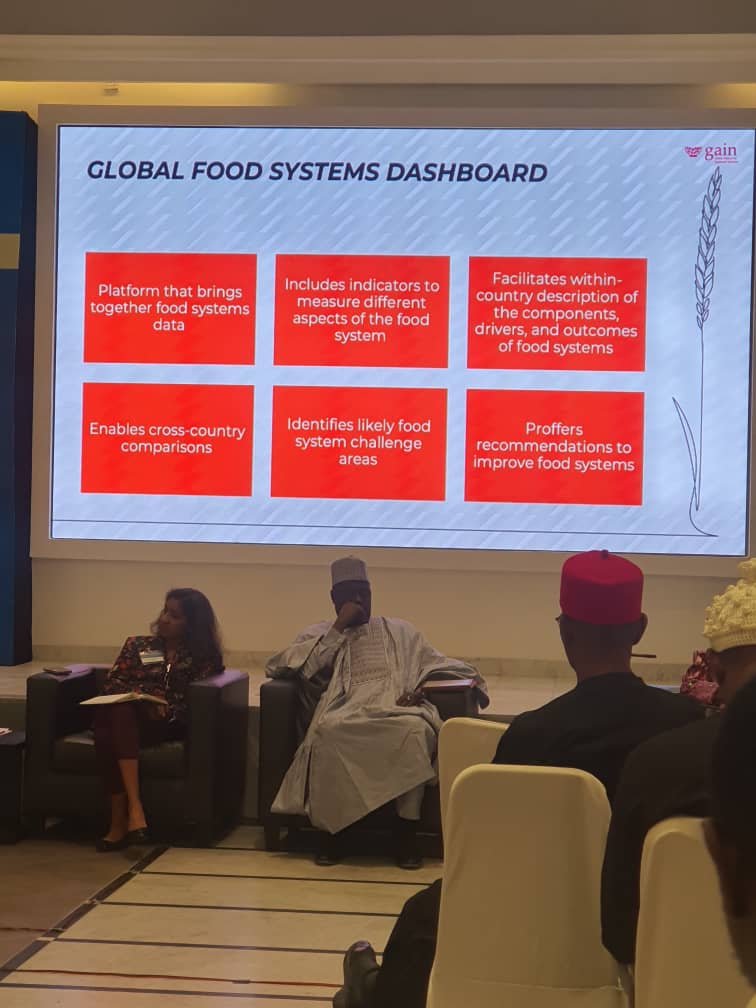***FG promises to restock food reserve system
Stakeholders have again expressed their commitment to putting in place a comprehensive approach to strengthening nutrition outcomes for sustainable healthy diets in Nigeria.
At the Launch of the 2024 Global Food Policy Report Jointly Organized by the International Food Policy Research Institute (IFPRI) and the Globa Aliance for Improved Nutrition (GAIN) with the theme”improving food system for healthy diets and nutrition in Nigeria.
The Co- Convener and the Country Director of GAIN, Dr Michael Ojo said the conference was designed to advance nutrition outcomes in improving the consumption of safe food for every Nigerians.
Also, the Senior Director food and nutrition policy, International Food Policy Research Institute, IFPRI. Purnima Menon, noted that the poor status of protein consumption globally remained the leading cause of protein deficiency.
She promised the Institute support to the Nigerian government towards explores policy solutions to improve diet and nutrition in the country
While unavailing the policy report, the Minister of state for Agriculture and food security, Dr. Aliyu Abdullahi reaffirmed the renewed hope agenda of president Bola Tinubu commitments to addressing food security concerns in the country and driving down the cost of living for the citizens.
He announced the Federal Governments plans to restock the National Strategic Food Reserve System to address food insecurity and stabilise food prices in the country.
The United Nations predicted that 82 million Nigerians, about 64 per cent of the country’s population, may go hungry by 2030, as it called on the government to tackle climate change, pest infestations, and other threats to agricultural productivity.
It also noted that “in Nigeria, 37 per cent of children, or 6 million children, are stunted (chronically malnourished or low height for age), more than half of them severely. In addition, 18 per cent of children suffer from wasting (acutely malnourished or low weight for height).”
Abdullahi stated that the government is working hard to ramp up food production, particularly for major staples like rice, maize, and cassava, to calm down the current food situation.
He noted that the country’s production is not only for local consumption but also for the West African region.
“The idea of the National Strategic Food Reserve is for us to be able to keep stock so that when prices of food are getting high, we release from the stock so that we stabilise the price,” Abdullahi explained.
The minister acknowledged that the reserve system was affected by the floods in 2021, but the government is now working to restock it starting from this year’s harvest.
He also mentioned that the government is distributing fertiliser and agrocphemicals to farmers to boost production.
Abdullahi called on Nigerians to support the government’s efforts to address food insecurity and stabilize food prices.
“We are working very hard to make sure that when the time comes, we can get more food into our reserves because that will help us to stabilise the production,” he said.
Related News
Abdullahi thanked the participants and called on Nigerians to work together to address the food insecurity challenge.
“We are aware that, honestly, what we produce in Nigeria, we are more or less producing for West Africa. People are aware of this. You go to the border markets, you see the kind of food that is leaving. So we are working very hard to make sure that when the time comes, we can get more food into our reserves because that will help us to stabilize the production”, he said.
Also speaking at the launch, the Chairman of the Senate Committee on Agriculture, Production Services and Rural Development, Dr. Kingsley Uzoma indicated that the committee will support the initiatives aimed at addressing food insecurity and malnutrition in the country.
The chairman said, “Anything that has to do with food insecurity, food malnutrition, it is something that we must all contribute and put our hands on the deck.”
He emphasized the importance of ensuring that farmers enjoy the benefits of their harvest, saying, “After a harvest, you want to come back home to see that you get the benefits of whatever you live off of.”
The chairman also highlighted the need for quality harvests, stating, “We are now talking of the quality of the harvest. And that is the only thing that can give us a healthy nation.”
He commended the organizers of the event and expressed the committee’s willingness to collaborate with them, saying, “Whatever we can pick from here and collaborate with you, we will make sure we have our part.”
The chairman also emphasised the importance of partnership, saying, “We look forward to partnering with you in areas where we believe our legislative role will enhance your efficiency.”
In his closing remark, the Country Director, GAIN, Nigeria, Michael Ojo who had earlier made a presentation on the importance of data for evidence-based policymaking and targeted interventions to address malnutrition and promote healthy diets, noted that urgent efforts are needed to support governments and other stakeholders at all levels—from global to local—in leveraging the Nigeria Subnational Food Systems Dashboard and other data sources.
“This will guide national nutrition plans, identify effective entry points for improving diets, set realistic goals for transforming food systems, and navigate trade-offs to combat malnutrition and foster healthier diets,” he noted.

